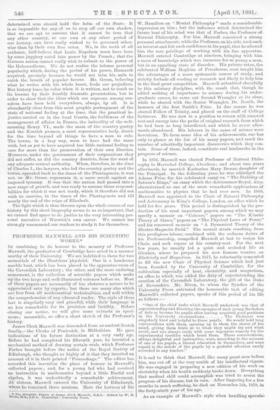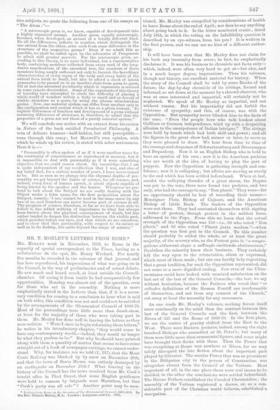PROFESSOR MAXWELL AND HIS SCIENTIFIC WORKS.*
IN combining to do honour to the memory of Professor Maxwell, the graduates of Cambridge have acted in a manner worthy of their University. We are indebted to them for two 'memorials of the illnstrious..physicist. One is a handsome marble bust, which has been placed in the apparatus-room of the Cavendish Laboratory ; the other, and the more enduring monument, is the collection of scientific papers which make up the two large and well-illustrated volumes before us. Most of these papers are necessarily of too abstruse a nature to be appreciated save by experts ; but there are many also which are free from all mathematical technicalities, and well within the comprehension of any educated reader. The style of these last is singularly easy and graceful, while their language is no less remarkable for its precision and lucidity. Before -closing our notice, we will give some extracts as speci- mens ; meanwhile, we offer a short sketch of the Professor's history.
James Clerk Maxwell was descended from an ancient Scotch family,—the Clerks of Penicuick, in Midlothian. He gave indications of his future distinction at a very early age. Before he had completed his fifteenth year, he invented a mechanical method of drawing certain ovals, which Professor Forbes brought before the notice of the Royal Society of Edinburgh, who thought so highly of it that they inserted an account of it in their printed "Proceedings." The editor has accorded this invention the place of honour in Maxwell's collected papers ; and, for a young Iad who had received no instruction in mathematics beyond a little Euclid and algebra, it was undoubtedly a remarkable achievement. At sixteen, Maxwell entered the University of Edinburgh, where he remained three sessions. Here the lectures of Sir • The Scientific Papers of Tames Clerk Maxwell, F.R.S. Edited by W. D. FA S. Cambridge : University Prose.
W. Hamilton on "Mental Philosophy" made a considerable impression on him ; but the influence which determined the future bent of his mind was that of Forbes, the Professor of Natural Philosophy. For him Maxwell conceived a strong personal attachment; while the Professor, on his side, took such an interest and felt such confidence in his pupil, that he allowed
him the rare privilege of working with his fine apparatus.• Maxwell entered Cambridge at nineteen, bringing with him
a mass of knowledge which was immense for so young a man, but in an appalling state of disorder. His private tutor, the celebrated William Hopkins of Peterhouse, soon taught him the advantages of a more systematic course of study, and strictly forbade all reading or research not likely to help him in the final great competition. Maxwell submitted cheerfully to this salutary discipline, with the result that, though he added nothing of importance to science during his under- graduate career, he came out Second Wrangler at its close, while he shared with the Senior Wrangler, Dr. Routh, the honours of the first Smith's Prize. In due course he was elected Fellow of Trinity, and placed on the staff of College lecturers. He was now in a position to return with renewed zest and energy into the paths of original research from which he had been so long interdicted, and which he never after- wards abandoned. His labours in the cause of science were herculean. To form some idea of his achievements, one has only to glance at the list of his many papers, and mark the number of admittedly important discoveries which they con- tain. Some of these, indeed, constitute real landmarks in the progress of science.
In 1856, Maxwell was elected Professor of Natural Philo- sophy in Marischal College, Aberdeen ; and about two years afterwards, he married Katharine Mary Dewar, daughter of the Principal. In the following year, he was adjudged the Adams Prize for his celebrated essay on " The Stability of Saturn's Rings," an essay which the Astronomer-Royal, Airy, characterised as one of the most remarkable applications of mathematics to physics that he had ever seen. In 1860, Maxwell was appointed to the Chair of Natural Philosophy and Astronomy in King's College, London, an office which he held for five years. This period is distinguished by the pro- duction of his most important papers, among which we may specify a memoir on "Colours," papers on "The Kinetic Theory of Gases," papers on " The Physical Laws of Force," and his renowned memoir on "A Dynamical Theory of the Electro-Magnetie Field." The mental strain resulting from this prodigious labour, combined with the arduous duties of his Professorship, compelled Maxwell at last to resign his Chair, and seek repose at his country-seat. For the next few years, he usually led a quiet and secluded life at
Glenlair, where he prepared his now famous treatise on Electricity and Magnetism. In 1871, he reluctantly consented
to fill the new Chair of Physical Science which had just
been founded by the University of Cambridge, for the cultivation especially of heat, electricity, and magnetism, an office to which was added the duty of superintending the erection of the Cavendish Laboratory, the gift of the Duke of Devonshire. Mr. Niven, to whom the Syndics of the University Press entrusted the honourable task of editing
Maxwell's collected papers, speaks of this period of his life as follows
"One of the chief tasks which Maxwell undertook was that of superintending and directing the energies of such young Bachelors of Arts as became his pupils after having acquired good positions
in the University examinations The Professor was
singularly kind and helpful to these pupils He would hold long
conversations with them, opening up to them the stores of his mind, giving them hints as to what they might try and what avoid, and was always ready with some ingenious remedy for the experimental troubles which beset them. These conversations, always delightful and instructive, were, according to the account of one of his pupils, a liberal education in themselves, and were repaid in the minds of the pupils by a grateful affection rarely accorded to any teacher."
It is sad to think that Maxwell, like many great men before
him, was cut off at the very zenith of his intellectual vigour. He was engaged in preparing a new edition of his work on
electricity when his health suddenly broke down. Everything that medical skill could accomplish was tried to arrest the progress of his disease, but in vain. After lingering for a few months in much suffering, he died on November 5th, 1879, in the forty-ninth year of his age.
As an example of Maxwell's style when handling specula;
tive subjects, we quote the following from one cf his essays on " The Atom :"—
" A microscopic germ is, we know, capable of development into a highly organised animal. Another germ, equally microscopic, becomes, when developed, an animal of a totally different kind. Do all the differences, infinite in number, which distinguish the one animal from the other, arise each from some difference in the structure of the respective germs ? Even if we admit this as possible, wo shall be called upon by the advocates of Pangenesis to admit still greater marvels. For the microscopic germ, ac- cording to this theory, is no more individual, but a representative body, containing members collected from every rank of the long- drawn ramifications of the ancestral tree, the numbers of these members being amply sufficient not only to furnish the hereditary characteristics of every organ of the body and every habit of the animal from birth to death, but also to afford a stock of latent gemmules to be passed on in an inactive state from germ to germ, till at last the ancestral peculiarity which it represents is revived in some remote descendant. Some of the exponents of this theory of heredity have attempted to elude the difficulty of placing a whole world of wonders within a body so small and so devoid of visible structure as a germ, by using the phrase structureless germs. Now, one material system can differ from another only in the configuration and motion which it has at a given instant. To explain differences of function and development of a germ without assuming differences of structure, is, therefore, to admit that the properties of a germ are not those of a purely material system."
We will conclude our notice with an extract from his review in Natwre of the book entitled Paradoxical Philosophy. A vein of delicate humour—half-hidden, but still perceptible— runs through this essay; but Maxwell's own opinion, with which he winds up his review, is stated with sober seriousness. Here it is :— "Personality is often spoken of as if it wore another name for the continuity of consciousness as reproduced in memory, but it is impossible to deal with personality as if it were something objective that we could reason about. My knowledge that I am is quite independent of my recollection that I was, and also of my belief that, for a certain number of years, I have never ceased to be. But as soon as we plunge into the abysmal depths of per- sonality we get beyond the limits of science, for all science, and, indeed, every form of human speech, is about objects capable of being known by the speaker and the hearer. Whenever we pre- tend to talk about the Subject we are really dealing with the Object under a false name, for the first proposition about the Subject, namely, 'I am,' cannot be used in the same sense by any two of us, and therefore can never become part of science at all. The progress of science, therefore, so far as we have been able to follow it, has added nothing of importance to what has always been known about the physical consequences of death, but has rather tended to deepen the distinction between the visible part, which perishes before our eyes, and that which we are ourselves, and to show that this personality, with respect to its nature as well as to its destiny, lies quite beyond the range of science."



































 Previous page
Previous page